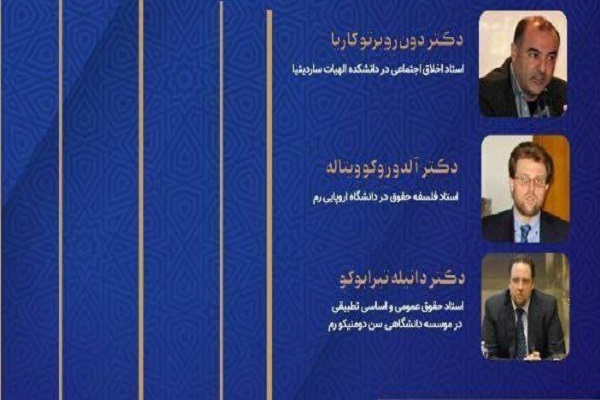Italian, Iranian Scholars Compare Western and Islamic Models of Freedom

The event, held on Thursday July 10, 2025, was part of a pre-conference for the 41st International Symposium on “People’s Rights and Legitimate Freedoms in the Ideology of Ayatollah Khamenei”.
Organized by the Research Institute of Iran’s Guardian Council and the Iranian Cultural Center in Italy, the session featured legal experts, philosophers, and social scientists from both countries.
Aldo Rocco Vitale, a philosophy of law professor at Rome’s European University, argued at the conference that Western societies face an identity crisis regarding freedom.
“While the West considers itself the cradle of liberty, it has lost touch with freedom’s authentic meaning,” he said. “Technology’s dominance, moral decline, and aggressive secularization have turned freedom into a tool for unchecked individualism—eroding public ethics and fueling authoritarian tendencies.”
Read More:
Citing Pope Benedict XVI, Vitale added, “The West no longer understands itself, its culture, or how to present itself to the world. Spiritual values have been sacrificed to economics and technology.”
He criticized the EU’s “abstract, one-size-fits-all” approach to freedom, stressing that definitions must align with cultural identity. “Freedom without truth or identity is meaningless. The West must return to human dignity and transcendent values.”
Daniele Tirabosco, a constitutional law professor at Rome’s San Domenico University, compared Western legal fluidity with Iran’s identity-based model.
“Western constitutionalism, stripped of metaphysical foundations by modernity, now embraces normative relativism,” he said. “Laws adapt to secular tastes rather than reflecting objective order.”
In contrast, he described Iran’s system as rooted in Islamic jurisprudence (Sharia), where the constitution embodies “religious and rational order” under the Guardian Jurist (Velayat-e Faqih).
“Justice here rests on fixed, divine principles—unlike the West’s unstable, individualistic foundations.”
Tirabosco urged Western legal systems to learn from Iran’s approach, where “law and justice are inseparable, anchored in a higher truth.”
Roberto Caria, a social ethics professor at Sardinia’s School of Theology, noted overlaps between Shia Islam and Catholicism, including divine origins of life, revelation guiding natural law, messianic traditions (Mahdism in Islam, Christ’s return in Christianity), intercession of saints/Imams.
He contrasted Iran’s theological legal framework with the West’s post-16th-century shift toward “authority, not truth, making law” (Autoritas non veritas facit legem).
Read More:
“In the West, human rights ignore divine responsibilities. Iran’s Constitution balances freedom with moral duty.”
Caria praised Iran’s Articles 12–13, which recognize religious minorities’ rights “not as mere tolerance but as respect within an Islamic framework”.
4294030



